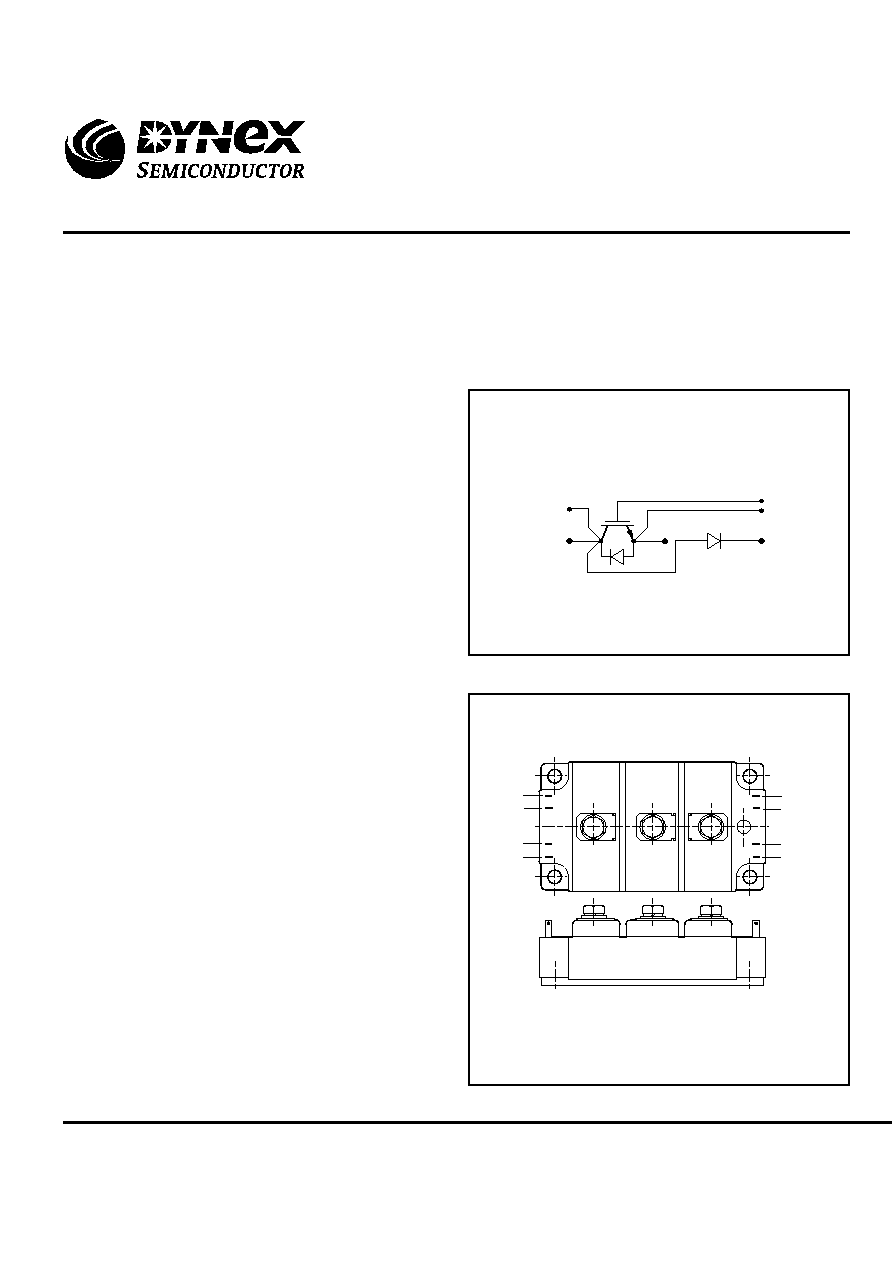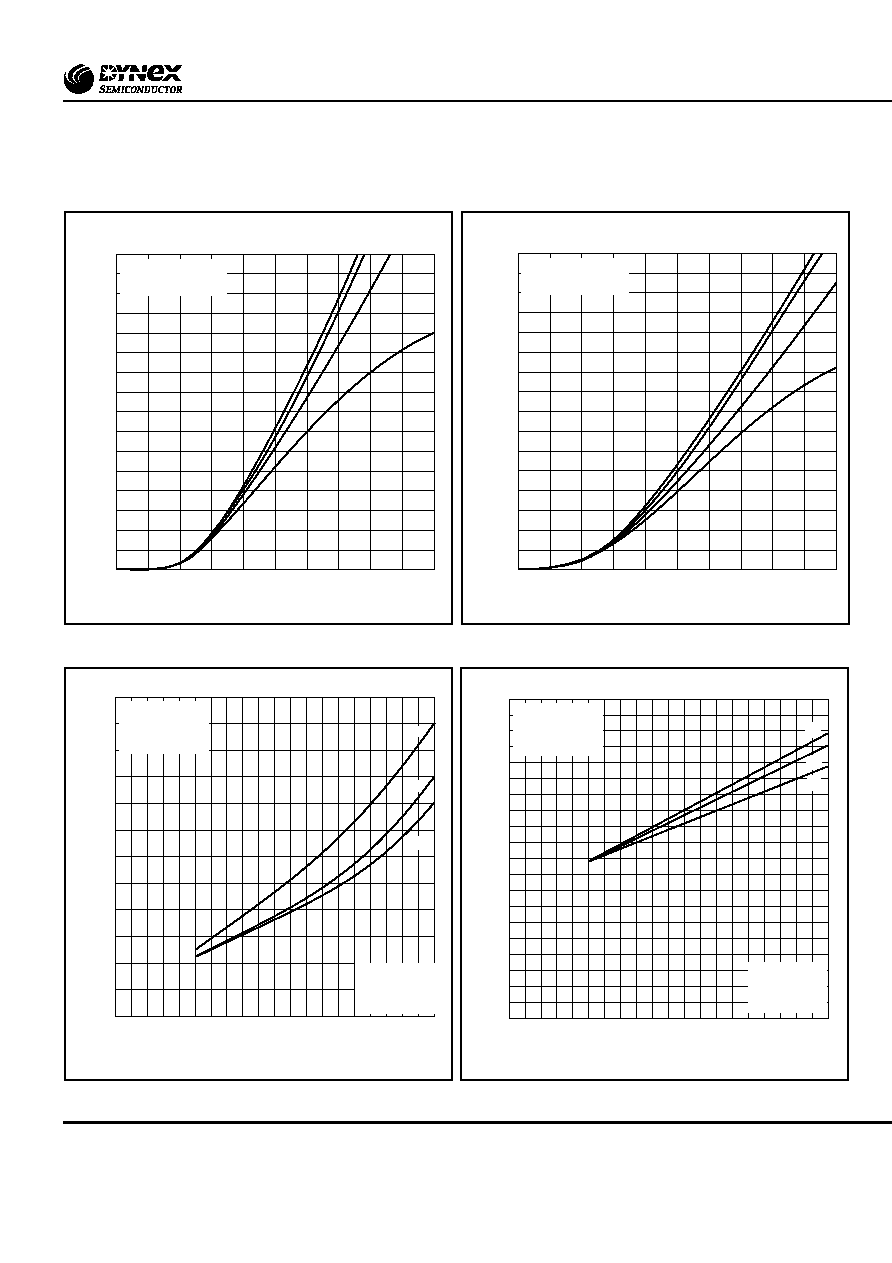Äîêóìåíòàöèÿ è îïèñàíèÿ www.docs.chipfind.ru

GP200MLS12
Caution: This device is sensitive to electrostatic discharge. Users should follow ESD handling procedures.
1/10
www.dynexsemi.com
FEATURES
s
Internally Configured With Lower Arm Controlled
s
Non Punch Through Silicon
s
Isolated Copper Baseplate
s
Low Inductance Internal Construction
APPLICATIONS
s
High Power Choppers
s
Motor Controllers
s
Induction Heating
s
Resonant Converters
s
Power Supplies
The Powerline range of high power modules includes half
bridge, dual and single switch configurations covering voltages
from 600V to 3300V and currents up to 2400A.
The GP200MLS12 is a 1200V, n channel enhancement
mode, insulated gate bipolar transistor (IGBT) chopper module
configured with the lower arm of the bridge controlled. The
module incoporates high current rated freewheel diodes. The
IGBT has a wide reverse bias safe operating area (RBSOA)
ensuring reliability in demanding applications.
The module incorporates an electrically isolated base plate
and low inductance construction enabling circuit designers to
optimise circuit layouts and utilise earthed heat sinks for safety.
ORDERING INFORMATION
Order As:
GP200MLS12
Note: When ordering, please use the whole part number.
KEY PARAMETERS
V
CES
1200V
V
CE(sat)
(typ)
2.7V
I
C
(max)
200A
I
C(PK)
(max)
400A
GP200MLS12
IGBT Chopper Module
Preliminary Information
DS5421-1.5 April 2001
Fig. 1 Chopper circuit diagram
Fig. 2 Electrical connections - (not to scale)
Outline type code: M
(See package details for further information)
3(K
1
)
2(E
2
)
1(A
1
C
2
)
11(C
2
)
6(G
2
)
7(E
2
)
1
2
3
11
10
8
9
5
4
6
7

GP200MLS12
2/10
Caution: This device is sensitive to electrostatic discharge. Users should follow ESD handling procedures.
www.dynexsemi.com
Test Conditions
Continuous dissipation -
junction to case
Continuous dissipation
Mounting torque 5Nm
(with mounting grease)
Transistor
Diode
-
Mounting - M6
Electrical connections - M6
Parameter
Thermal resistance - transistor (per arm)
Thermal resistance - antiparallel diode
Thermal resistance - freewheel diode
Thermal resistance - case to heatsink (per module)
Junction temperature
Storage temperature range
Screw torque
THERMAL AND MECHANICAL RATINGS
ABSOLUTE MAXIMUM RATINGS - PER ARM
Stresses above those listed under 'Absolute Maximum Ratings' may cause permanent damage to the device. In extreme
conditions, as with all semiconductors, this may include potentially hazardous rupture of the package. Appropriate safety
precautions should always be followed. Exposure to Absolute Maximum Ratings may affect device reliability.
T
case
= 25°C unless stated otherwise
Symbol
V
CES
V
GES
I
C
I
C(PK)
P
max
V
isol
Test Conditions
V
GE
= 0V
-
DC, T
case
= 72°C
1ms, T
case
= 72°C
T
case
= 25°C, T
j
= 150°C
Commoned terminals to base plate. AC RMS, 1 min, 50Hz
Units
V
V
A
A
W
V
Max.
1200
±
20
200
400
1490
2500
Parameter
Collector-emitter voltage
Gate-emitter voltage
Collector current
Peak collector current
Max. transistor power dissipation
Isolation voltage
Symbol
R
th(j-c)
R
th(j-c)
R
th(c-h)
T
j
T
stg
-
Units
°C/kW
°C/kW
°C/kW
°C/kW
°C
°C
°C
Nm
Nm
Max.
84
160
80
15
150
125
125
5
5
Min.
-
-
-
-
-
-
40
-
-

GP200MLS12
Caution: This device is sensitive to electrostatic discharge. Users should follow ESD handling procedures.
3/10
www.dynexsemi.com
Test Conditions
V
GE
= 0V, V
CE
= V
CES
V
GE
= 0V, V
CE
= V
CES
, T
case
= 125°C
V
GE
=
±
20V, V
CE
= 0V
I
C
= 10mA, V
GE
= V
CE
V
GE
= 15V, I
C
= 200A
V
GE
= 15V, I
C
= 200A, , T
case
= 125°C
DC
t
p
= 1ms
I
F
= 200A
I
F
= 200A, T
case
= 125°C
I
F
= 200A
I
F
= 200A, T
case
= 125°C
V
CE
= 25V, V
GE
= 0V, f = 1MHz
-
Parameter
Collector cut-off current
Gate leakage current
Gate threshold voltage
Collector-emitter saturation voltage
Diode forward current
Diode maximum forward current
Diode forward voltage - antiparallel diode
Diode forward voltage - freewheel diode
Input capacitance
Module inductance
ELECTRICAL CHARACTERISTICS
T
case
= 25°C unless stated otherwise.
Symbol
I
CES
I
GES
V
GE(TH)
V
CE(sat)
I
F
I
FM
V
F
C
ies
L
M
Units
mA
mA
µ
A
V
V
V
A
A
V
V
V
V
nF
nH
Max.
1
12
±
1
6.5
3.5
4.0
200
400
2.4
2.5
2.1
2.2
-
-
Typ.
-
-
-
-
2.7
3.2
-
-
2.2
2.3
1.7
1.7
25
30
Min.
-
-
-
4.5
-
-
-
-
-
-
-
-

GP200MLS12
4/10
Caution: This device is sensitive to electrostatic discharge. Users should follow ESD handling procedures.
www.dynexsemi.com
Units
ns
ns
mJ
ns
ns
mJ
µ
C
Max.
700
200
35
550
110
30
30
Typ.
500
150
25
400
80
20
20
Min.
-
-
-
-
-
-
-
Test Conditions
I
C
= 200A
V
GE
=
±
15V
V
CE
= 600V
R
G(ON)
= R
G(OFF)
= 4.7
L ~ 100nH
I
F
= 200A, V
R
= 50% V
CES
,
dI
F
/dt = 2500A/
µ
s
Parameter
Turn-off delay time
Fall time
Turn-off energy loss
Turn-on delay time
Rise time
Turn-on energy loss
Diode reverse recovery charge -
freewheel diode
ELECTRICAL CHARACTERISTICS
T
case
= 25°C unless stated otherwise
Symbol
t
d(off)
t
f
E
OFF
t
d(on)
t
r
E
ON
Q
rr
T
case
= 125°C unless stated otherwise
Units
ns
ns
mJ
ns
ns
mJ
µ
C
Max.
800
250
50
650
150
55
70
Typ.
600
200
40
500
110
40
55
Min.
-
-
-
-
-
-
-
Test Conditions
I
C
= 200A
V
GE
=
±
15V
V
CE
= 600V
R
G(ON)
= R
G(OFF)
= 4.7
L ~ 100nH
I
F
= 200A, V
R
= 50% V
CES
,
dI
F
/dt = 2000A/
µ
s
Parameter
Turn-off delay time
Fall time
Turn-off energy loss
Turn-on delay time
Rise time
Turn-on energy loss
Diode reverse recovery charge -
freewheel diode
Symbol
t
d(off)
t
f
E
OFF
t
d(on)
t
r
E
ON
Q
rr

GP200MLS12
Caution: This device is sensitive to electrostatic discharge. Users should follow ESD handling procedures.
5/10
www.dynexsemi.com
TYPICAL CHARACTERISTICS
Fig. 3 Typical output characteristics
Fig. 4 Typical output characteristics
Fig. 5 Typical turn-on energy vs collector current
0
50
100
150
300
350
400
0
1.0
2.0
3.0
4.0
5.0
Collector-emitter voltage, V
ce
- (V)
Collector current, I
C
- (A)
V
ge
= 20/15/12/10V
Common emitter
T
case
= 25°C
250
200
0
50
100
150
300
350
400
0
1.0
2.0
3.0
4.0
5.0
Collector-emitter voltage, V
ce
- (V)
Collector current, I
C
- (A)
V
ge
= 20/15/12/10V
Common emitter
T
case
= 125°C
250
200
0
200
50
Collector current, I
C
- (A)
0
40
Turn-on energy, E
ON
- (mJ)
T
j
= 125°C
V
GE
=
±
15V
V
CE
= 600V
A: R
g
= 10
B: R
g
= 6.2
C: R
g
= 4.7
A
B
C
50
60
10
20
30
100
150
Fig. 6 Typical turn-off energy vs collector current
0
200
50
100
Collector current, I
C
- (A)
0
5
15
50
Turn-off energy, E
OFF
- (mJ)
T
j
= 125°C
V
GE
=
±
15V
V
CE
= 600V
A: R
g
= 10
B: R
g
= 6.2
C: R
g
= 4.7
A
B
C
20
25
30
35
40
45
150
10




